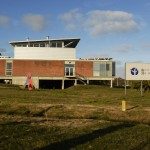About
How cells grow and divide with extraordinary accuracy is at the center of all forms of life and has been a focus of research for many decades. Even though our understanding of the underlying processes has been greatly advanced, many detailed mechanistic questions of these highly complex and dynamic processes remain elusive. This is particularly true in Corynebacteriales, a suborder of Gram-positive rod-like actinobacteria with a highly unusual cell wall that includes important human pathogens such as Mycobacterium tuberculosis, Mycobacterium leprae or Corynebacterium diphtheriae. Many of the key cell division proteins identified in E. coli or B. subtilis have no recognizable homologues, and alternatively several Corynebacteriales-specific divisomal proteins have been proposed. A reason for this could be the underlying bacterial physiology and in particular the actinobacterial cell wall composition and mode of elongation, that is polar, as opposed to lateral. Substantial evidence has been accumulated showing that reversible protein phosphorylation by serine/threonine protein kinases and phosphatases plays essential signaling roles in bacterial physiology and our central working hypothesis is that phosphorylation plays a crucial role in the spatio-temporal regulation and quaternary organization of the cell division machinery. We investigate phospho-dependent protein-protein interactions governing divisome and elongasome assembly and regulation in Corynebacteriales using an integrative biology approach combining the fields of structural biology, bacterial signaling, phosphoproteomics, bacterial genetics and cell biology.
In particular we focus on: (i) early divisome assembly and Z-ring regulation (ii) Late divisome assembly via in vitro reconstitution of stable sub-complexes (iii) Septum to pole transition and elongasome sub-complexes involved in these processes.
The scientific outcomes will shed light on the regulation of a fundamental and cardinal process of bacterial cell biology. The benefits are diverse and range from an immediate knowledge of cell division to the opening of new concepts concerning the inner-workings of a living cell right through the better understanding of the constantly growing role of phosphorylation in bacterial physiology. Furthermore, since cell division is fundamental to all forms of life, a better understanding of how bacteria grow and divide at the molecular level is not only important for cell biology, but it is also expected to have a strong impact on biomedical research.




